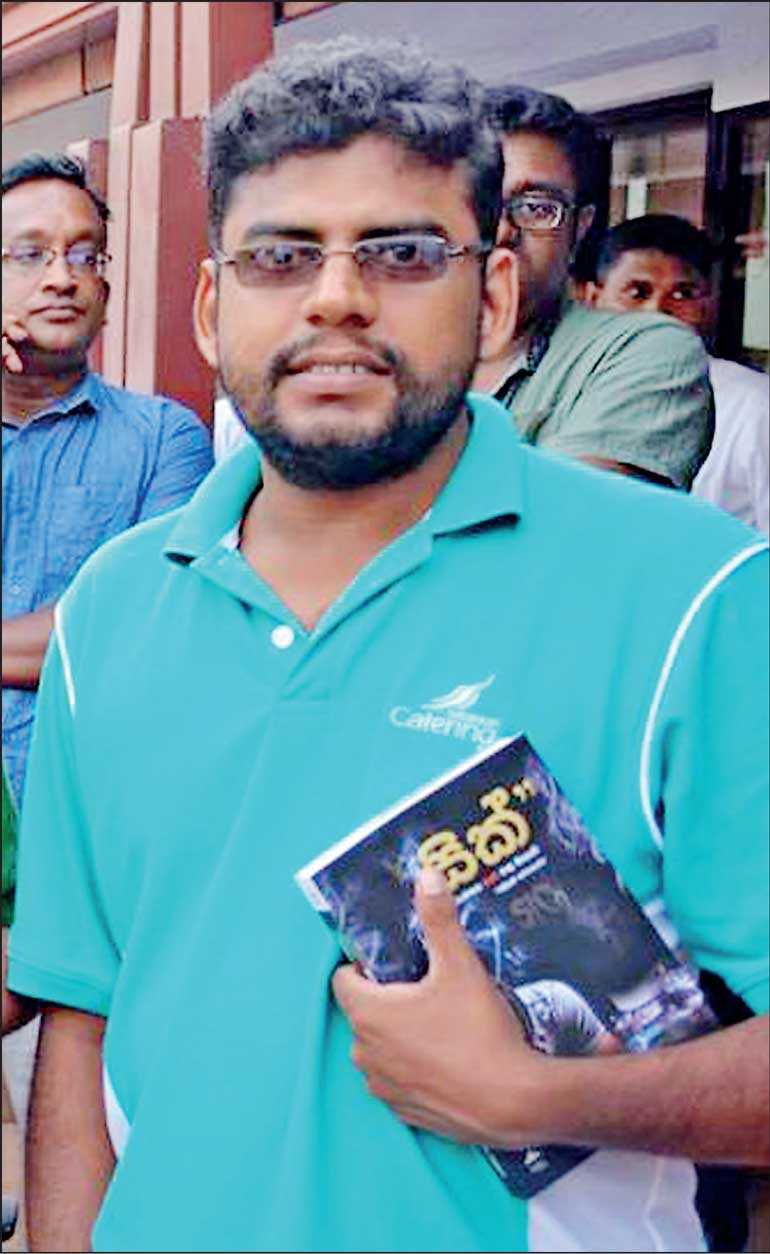Wednesday Feb 18, 2026
Wednesday Feb 18, 2026
Friday, 5 April 2019 00:00 - - {{hitsCtrl.values.hits}}

‘Ardha’ is a Sanskrit word which means ‘half’. Post-modernist Sinhala writer and poet Shakthika Sathkumara wrote a short story captioned ‘Ardha’ and posted it on his Facebook page. Now he is in remand custody charged for an offense under the ICCPR act. 
A creative artist relies on his mind to see, hear feel and smell. That is how writers, artists, composers create the beauties and the ugliness of the world.
In medieval times creators of beauty, truth and human squalor were persecuted. In the new age of fake righteousness attempted by statute and proclamations we seem to be returning to our tribal roots.
Our free press – print and electronic – did not report the incident. The incident has gone viral on the internet. The international news agency AFP has reported the Orwellian ordeal of Shakthika Sathkumara to the world. The story datelined Colombo 1 April is succinct.
A Sri Lankan novelist has been arrested for writing about homosexuality in the Buddhist clergy and charged with violating international human rights law, officials said on Tuesday, outraging free speech advocates.
Shakthika Sathkumara, 33, was arrested in the north-central town of Polgahawela on Monday and remanded in custody for nine days after monks complained about his writing.
“A group of monks complained that the reference to homosexual activities among the clergy insulted Buddhism,” a police spokesman said.
The police spokesman said the monks who complained refused to settle the matter out of court and insisted on Sathkumara being prosecuted. He was taken before a local magistrate who charged him with inciting “religious hatred” under the United Nation’s international human rights treaty, to which Sri Lanka is a signatory.
The Polgahawela police have charged him for an offense under the ICCPR act which is non-bailable. On the face of it, the action of the police officer is an absolute travesty of the universal covenant on political and civil rights.
The accused has written a short story. Some Buddhist monks have found the story line to be offensive. They have every right to express their opposition. But here is the rub. They have insisted the man be locked up. Now they have been appeased.
The right to freedom of expression and access to such information falls squarely and precisely within the category of civil and political rights. It is the most fundamental ‘empowering right’, that facilitates the implementation of all other human rights such as the right to participation in political and public life. The ability to exercise this right of free expression of a writer or a poet is a key precondition for human progress.
What is the grave offense committed by Shakthika Sathkumara in writing his short story ‘Ardha’?
To begin with, I don’t find it to be of great literary merit. On a scale of one to 10 I would give it a grudging four points. That said, it is indeed a commendable attempt at experimental postmodernist creative writing.
Postmodernist writing is not banned in Sri Lanka. Sri Lanka has however, declared the ‘Theravada Tripitaka’ as a national heritage. We are now appealing to make it a heritage of the planet and mankind.
Now, that is a moot point that should be taken note of by the Defence Secretary who for long years was our national Olympian. One of the three pitaka is the Vinaya pitaka that deals with the sexuality of human beings in general and the ordained ‘Sramana’ or monks specifically.
What is postmodernist creative writing? It relies on parody, black humour, and is usually defiant of traditional literary conventions. In short, its existence is the quest for the permanent paradox.
Postmodern stories are often intertextual. It moves on the relationship between several texts.
‘Ardha’ is the story of a young university enrolled monk who after disrobing finds temporary shelter in the ‘Boadima’ of a friend. The opening lines are bitingly abrupt.
“Halwelle Kassapa himi became Kasan Palihawadana not because he was enamoured with the lay life. He was not particularly fond of the monastic order either.”
Kasan Palihawadana is greeted by another robed university mate. “Liberated, liberated, Kassa is finally liberated. I suppose you will not want to remain in the same hostel. Just as well. Now you don’t have to wait till dusk to fetch groceries.”
Kasan moves into the hostel of lay friend Lloyd Aiya. Lloyd describes the sketch of a short story he intends to write. It is a rebellious twist to Siddhartha’s renunciation of worldly pleasures and sorrows.
Kasan advises Lloyd that ours is an orthodox Theravada Buddhist society where such narratives would be frowned on.
Apart from these two subtexts, the main protagonist Kasan is much troubled man. He has a fearsome, disquieting dream. Waking up from the Freudian dream he refreshes himself in the bathroom and creeps back under the mosquito net. Lloyd Aiya quietly slips into the room and his quiet murmurs reach Kasan’s half-awake ears. The pungent whiff of Lloyd Aiya reminds Kasan of his “Loku Hamuduruwo’s” body smell.
How does the Vinaya Pitaka deal with homosexuality or hetero sexuality?
The Vinaya Pitaka refers to several instances of homosexual, heterosexual and transsexual behaviour. The most pivotal instance is where it highlights the episode of the monk Wakkali who became a monk purely because he was physically attracted to how handsome Lord Buddha was. There is also an instance of a novice monk masturbating an older monk. The Buddha referred even to intercourse with animals because of a monk indulging in sex with a female monkey.
The ‘Vinaya’ rules on sexual behaviour of monks makes no reference to any specific sexual act. It forbids monks to insert their sex organs in to any bodily orifices – which common sense would include the vaginal, anal and oral stimuli!
In ancient India homosexuals were simply identified as the third nature ‘trithya prakthi’. Whether it is a deviant practice or not is not the issue in Shakthika’s story. It is the realism embedded in the yarn that has upset the holy hornet’s nest.